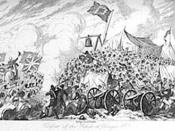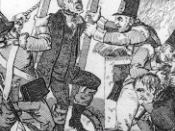Father James Dixon was one of the three convict priests transported from Ireland among the 560 Irishmen so punished after the 1798 Rebellion of the United Irishmen, a joint Protestant and Catholic uprising led by the Ulsterman Wolfe Tone and inspired by the French Revolution principles of liberty, equality and fraternity.
Father Dixon was described as a "kind and inoffensive man, rather wanting in energy and decision". A priest of Ferns diocese, he was not the stuff of rebels, and was friendly with the local Protestant gentry and clergy.
Protestant and Catholic friends attest that Dixon played no part in the insurrection. He was unlucky enough to belong to a family who were heavily involved, such as his cousin Father Thomas Dixon, who had been suspended by his bishop in 1794 for "drinking, dancing and disorderly conduct". Captain Nicholas Dixon, a rebel leader was his brother and another brother or cousin Captain Thomas Dixon was accused of a leading role in a massacre of loyalist prisoners on Wexford Bridge.
This was the background to his condemnation. He arrived in Australia on February 17th, 1800.
The population then was about 5,000 and a couple of thousand larger in 1803. About one third were Catholics. Philip Gidley King was the Governor. He was a decent man of genuine faith, sometimes bad tempered and bibulous, capable of cruelty when his high hopes were disappointed. He had a difficult job running the colony as he battled Macarthur and the Rum Corps. He lamented their "credulous ignorance" and believed "no description of people are so bigoted to their religion and priests as the Irish".
Local Catholics had again petitioned for a priest in 1792 and 1796 and the Governor believed that a steady priest like Dixon would improve convict behaviour and prevent another local rising...



Ok
Its Good but it dosn't go into detail...
But i would give it a pass. :)
0 out of 0 people found this comment useful.